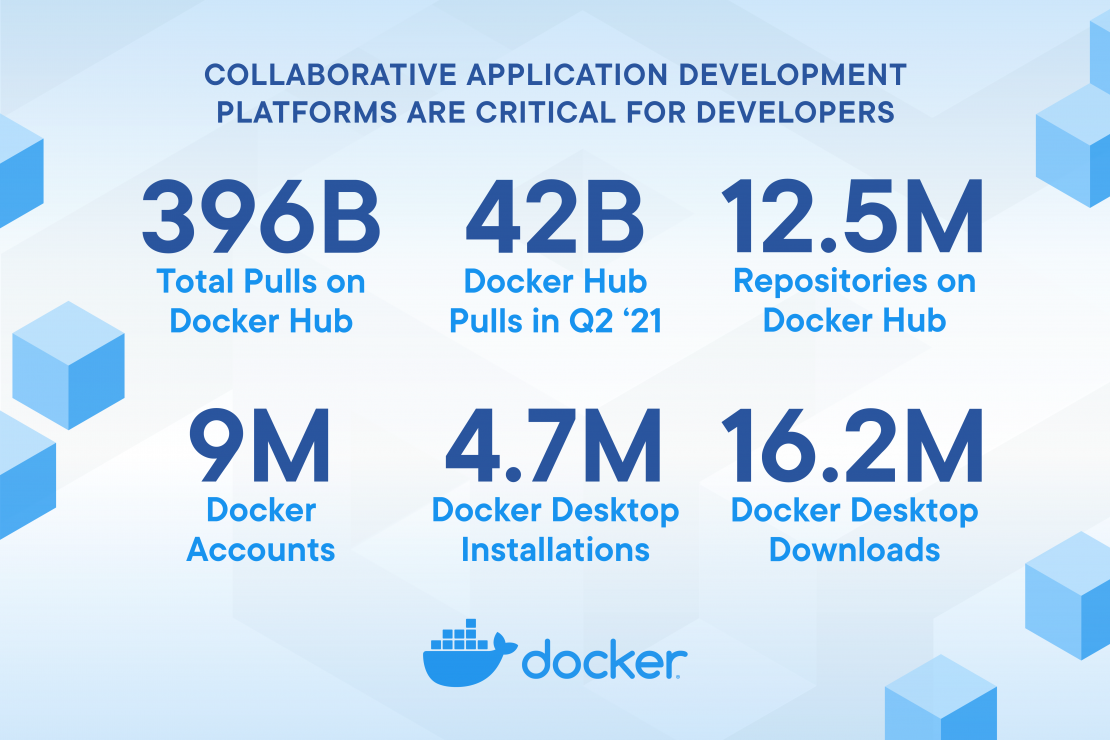The latest edition of the Docker Index is in, and it shows a continued growth in activity across the Docker community. The momentum we are seeing since the last Docker Index in February 2021 edition continues to grow.
You’ll recall that we started publishing the Docker Index in early 2020 as a way to provide insight into trends in application development, mining anonymized data from millions of Docker users. Every time we’ve published the Docker Index since then (this is our fourth Docker Index post), we’ve been amazed at the findings.
As of Aug. 31, 2021, there’s been a total of 396 billion all-time pulls on Docker Hub — up from 318 billion just six months ago and an increase of about 25% year-over-year. In addition, there were 42 billion Docker Hub Pulls in the second quarter of 2021 (calendar year), up from 30 billion in the fourth quarter of 2020, likely reflecting a continued accelerating demand for more applications as the pandemic shutdown accelerated businesses’ digital transformation efforts. Docker Trusted Content — including Docker Official Images, Docker Verified Publisher content and Docker-sponsored Open Source projects — is available at all Docker subscription levels.
These increases paint a clear picture of collaborative application development platforms as the foundation for developers who want to build, share and run modern apps.
The numbers are up across the board. The number of application container image repositories on Docker Hub reached 12.5 million, up from 8.3 million in our February Index, and representing a more than 50% year-over-year increase in the application components that developers rely on to build apps.
There are now 9 million Docker Hub accounts, up about 30% year-over-year. Docker Desktop installations have risen to 4.7 million from 3.3 million in February this year, and Docker Desktop downloads stand at 16.2 million.

Meanwhile, according to the 2021 Stack Overflow Developer Survey, based on a survey of over 83,000 software developers, Docker continues to be extremely popular among developers. Along with Git and Kubernetes, it’s among both the most loved and most wanted tools.
Over 76% said they loved Docker, behind Git (nearly 85%) and ahead of Kubernetes (over 72 %). And Docker led the pack with nearly 30% expressing an interest in developing with it.
And according to a DevOps survey by JetBrains, Docker users are three times more likely to be found working as DevOps engineers or infrastructure developers, two times more likely to be architects, and 30% more likely to serve as team leads. They are also more likely to have a senior position.
Thanks again to the entire Docker community and ecosystem for the ongoing innovation, feedback and commitment to one another that makes Docker more vibrant and relevant to the evolving and expanding needs of developers. Finally developer feedback and input is core to how we guide our investments into the Docker platform. I want to encourage you all to provide feedback and requests about what you want to see in Docker by commenting on our public roadmap.
